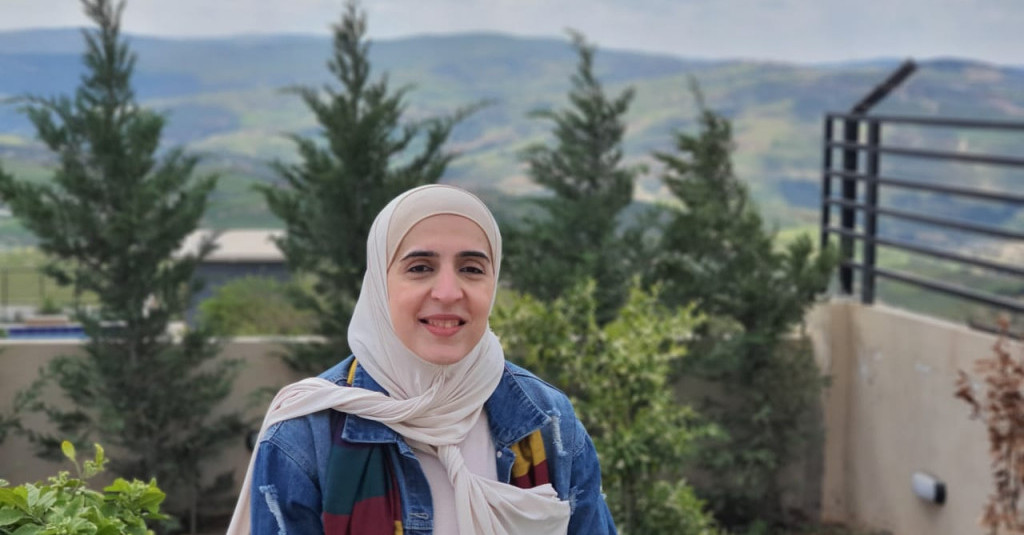From Pharmacy to Humanitarian Work: An Ajman University Alumna’s Inspiring Journey

The Syrian refugee crisis in Jordan inspired Areej Jadallah’01, an Ajman University College of Pharmacy alumna to choose a career in humanitarian aid. Areej is now making her impact felt as a Senior Program Officer at leading global NGO, Mercy Corps. This is her story.
Areej Jadallah took her first tentative step towards a career after graduating from the Bachelor of Pharmacy program at Ajman University in 2001. However, it was not until the Syrian refugee crisis started that she found her true calling. Areej had shifted to Jordan with her family to work in community pharmacies, where she became a member of the Jordan Pharmacists’ Association.
When Syrian refugees started arriving in Jordan due to the conflict in Syria, Areej volunteered for aid work. In collaboration with other pharmacists and doctors, she organized free medical days for refugees to help them fight disease and stay healthy in challenging living conditions.
“With each passing day, my resolve strengthened to choose humanitarian work as my permanent career. Whatever little I was able to do to alleviate the pain of the suffering refugees, gave me immense personal satisfaction and inspired me to continue my work,” says Areej.
As a member of an international NGO, she was also involved in promoting hygiene in government schools which had recently opened their doors to Syrian refugee children. Areej traveled across Jordan to conduct awareness sessions in schools about water-borne diseases and prevention. She organized training courses for teachers on hygiene management, presenting them certificates on successful completion.
This encouraged her to seek validation of her own work in humanitarian aid, and she eventually obtained a Diploma in NGO & Volunteer Work Management from the German Jordanian University.
Challenging Journey
Recognizing her work, a French NGO appointed Areej as Supervisor for their WASH program (Water, Hygiene, and Sanitation), focused on taking care of the basic needs, health and dignity of refugees in the camp. That’s also where she faced one of the biggest challenges of her career so far, the outbreak of the deadly Hepatitis disease in the camp.
“It was one of the most challenging periods of my career; I was working round the clock with healthcare officials in the camp to end the outbreak. My team and I were responsible for the well-being of more than 35,000 individuals in the camp and everyone looked up to us, as leaders of the program, to end the Hepatitis outbreak,” recalls Areej.
Not one to be daunted by challenges, Areej has continued her humanitarian work as a Senior Program Officer at Mercy Corps, a membership organization of international NGOs, collectively responsible for taking care of more than 100,000 refugees across several camps.
Great learning
“I have many real stories to share and testimonies of what happened in Syria and Jordan during this crisis. I’ve learned that to be a humanitarian, the most important thing is to embrace your own humanity,” says Areej, reflecting on her experiences as a humanitarian aid worker.
To put things in perspective, she shares one of her favorite quotes from a book by Susan Minot. “People look at authors and think they’re trying to tell their story. But really what they’re trying to say is what it’s like to be alive. This book isn’t to make aid work look glamorous or to suggest that aid workers are “great people doing great things. Instead, through the essays, contributors are saying, “Look, here’s a sliver of human existence full of suffering and misery, and also joy, and laughter, and amazing people. This is what it’s like to be alive.”
AU helped shape her journey
Areej credits her success as a humanitarian aid professional to her education at Ajman University. “The diversity in the students’ nationalities provided me an opportunity to learn about different cultures and trained me for multicultural work environments. The social responsibility and healthcare initiatives by AU that involved working with local communities, sensitized me to the importance of welfare work and its far-reaching impact,” said Areej.
Areej is also proud of being a pharmacist as they have a ‘strong positive impact in society’. She is currently pursuing a Master’s degree in Public Health and Health Promotion from a university in the UK.
Advising future students, Areej says, “Realize that university is work; it’s not playtime. Don’t ignore your academic problems, speak to your lecturers and parents and strive to understand. Settle for nothing less than your very best. Most importantly, listen to that little voice inside you that says, I can do this. Believe in yourself.”